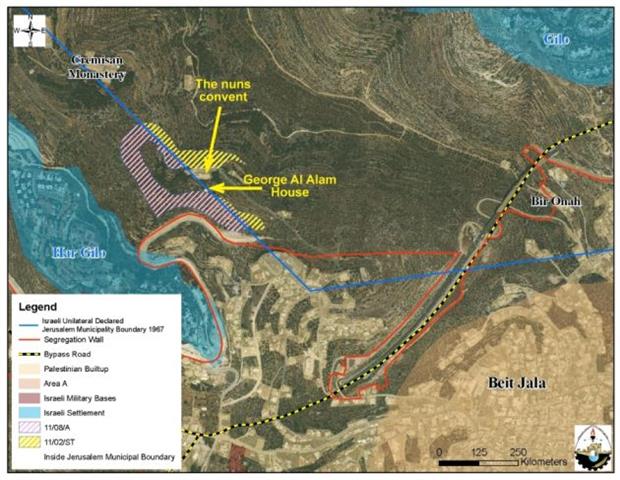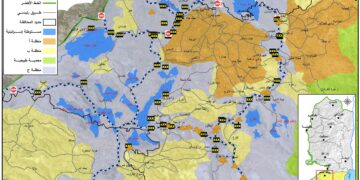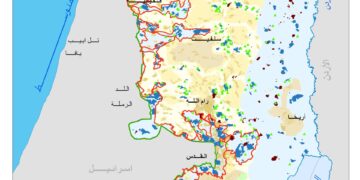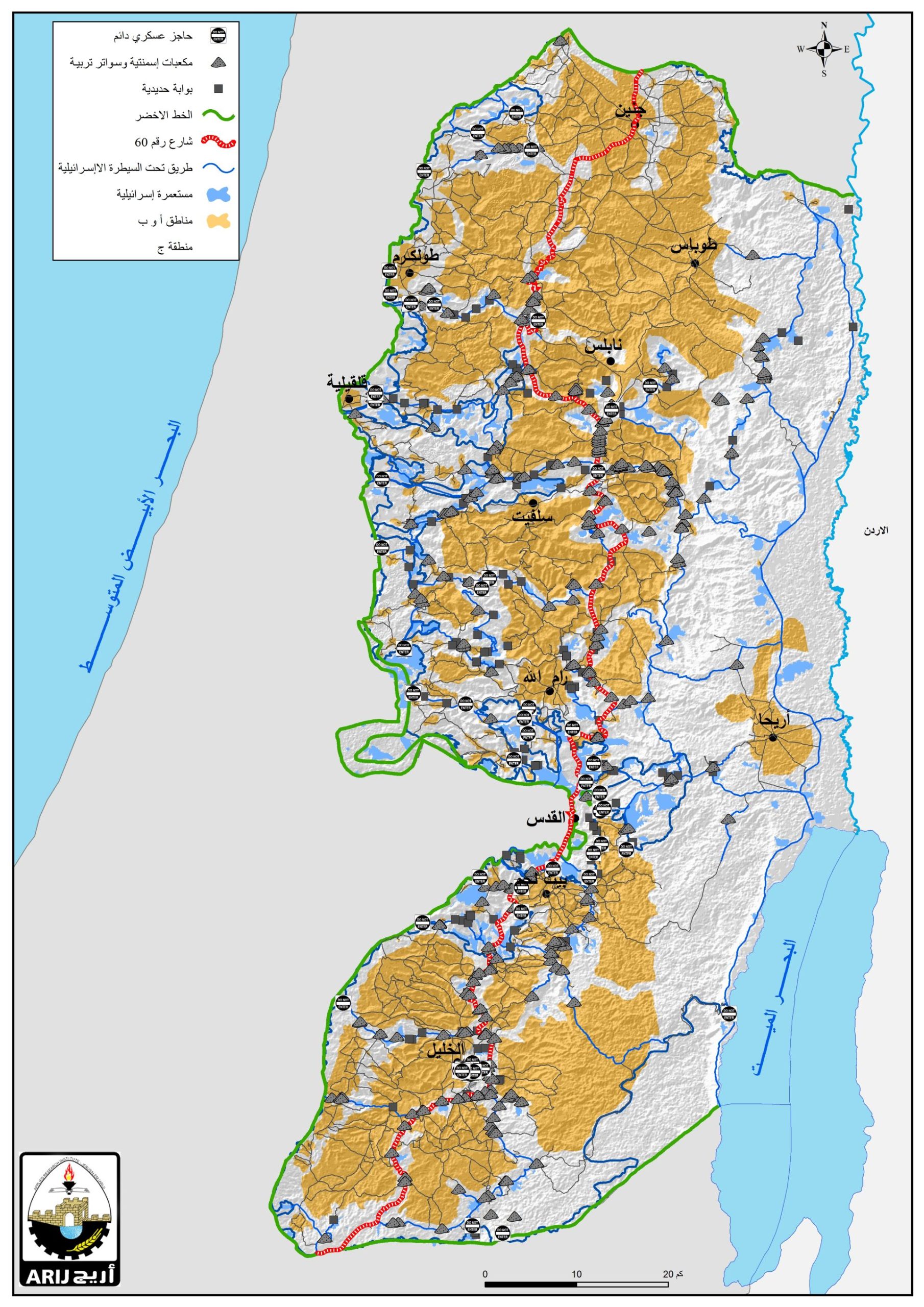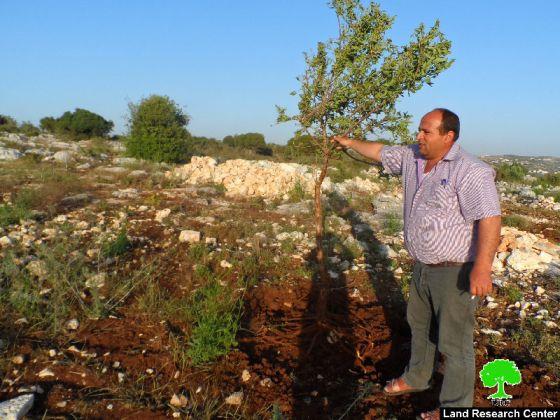Two and a half months after the final hearing on the route of the Israeli Segregation Wall on lands of Cremisan Valley in Beit Jala city (February 12, 2013), the Israeli Special objections Committee ruled[1] on the 26th of April 2013 that Israel to continue the construction of the Israeli Segregation wall on lands of Cremisan valley in Beit Jala city, thus ignoring all testimonies of Palestinian landowners who will be severely affected by the construction of the wall as they will be separated from their lands and properties in the area.
The construction of the wall will be based on two previously issued Israeli military orders of 2011. The first military order holds number (11/08/T) and was issued by the Israeli Ministry of Defense on September 22, 2011, and signed by Abi Mezrahi the chief commanding officer of the Israeli Occupation Army in the West Bank. This order, as stated, will seize 37.3 dunums of Cremisan lands; while the second military order holds number (11/02/ST) and was also issued from the Israeli Ministry of Defense on the 22nd of September 2011 and signed by the director of the ministry as the targeted lands are located inside the unilaterally declared boundary of the Israeli municipality of Jerusalem; under which 15.2 dunums will be expropriated from Beit Jala lands. Note that the 52.5 dunums of lands slated for confiscation are merely for the construction of the wall route itself while in fact the wall will cause the isolation of thousands of dunums of Palestinian lands behind it in that area. See Map 1
Analysis of the Israeli ruling
According to the military orders, the route of the Israeli Segregation Wall will surround the nuns’ convent and school from three directions (north, west and south), as well as the house of Mr. George al Al Alam located nearby, leaving both, the convent and the house, on the eastern side of the wall with an open road to access the center of life in Beit Jala city. It is expected that a gate will be erected to provide the nuns access to the Cremisan monastery, with which they have strong ties, and to Jerusalem. The court also added in its ruling that the State of Israel will be flexible in issuing permits to Palestinian land owners to access their lands which will become isolated within the route of the wall. However, nothing in the court’s statement guarantees that permits will be granted to Palestinian land owners whose lands will become isolated west of the wall, or even respected by the Israeli soldiers if they are granted.
Among Palestinian families threatened by the construction of the Israeli segregation wall are: Khalilieh, Al Alam, Abu ‘Amsha, Abu Eid, Hani, Abu Rumman, Qissieh and Abumohor.
To conclude
Under the guise of security, Israel is using the wall as a direct tool to seize lands as it will deprive Palestinians thousands of dunums of lands. The appropriation of land by the occupying power is prohibited under international humanitarian law and contravenes Israel’s obligations[2] under the fourth Geneva Convention of 1949, article 47, which states that ‘Protected persons who are in occupied territory shall not be deprived, in any case or in any manner whatsoever, of the benefits of the present Convention by any change introduced, as the result of the occupation of a territory, into the institutions or government of the said territory, nor by any agreement concluded between the authorities of the occupied territories and the Occupying Power, nor by any annexation by the latter of the whole or part of the occupied territory.’
Article 53 of the same convention also stipulates that “’Any destruction by the Occupying Power of real or personal property belonging individually or collectively to private persons, or to the State, or to other public authorities, or to social or cooperative organizations, is prohibited, except where such destruction is rendered absolutely necessary by military operations.’
The Segregation Wall also contravenes with the International Covenant on Civil and Political Rights and the International Covenant on Economical, Social, and Cultural Rights both of which Israel has signed.
The International Covenant on Civil and Political Rights (ICCPR) – Property (ICCPR, article 1): All peoples have the right of self-determination. By virtue of that right they freely determine their political status and freely pursue their economic, social and cultural development.
The International Covenant on Economic, Social and Cultural Rights (ICESCR) – health (ICESCR, article 12): The States Parties to the present Covenant recognize the right of everyone to the enjoyment of the highest attainable standard of physical and mental health.
The International Covenant on Economic, Social and Cultural Rights (ICESCR) – Education (ICESCR, art.13: The States Parties to the present Covenant recognize the right of everyone to education. They agree that education shall be directed to the full development of the human personality and the sense of its dignity, and shall strengthen the respect for human rights and fundamental freedoms.
The International Covenant on Economic, Social and Cultural Rights (ICESCR) – Food (ICESCR, art. 11): The States Parties to the present Covenant recognize the right of everyone to an adequate standard of living for himself and his family, including adequate food, clothing and housing, and to the continuous improvement of living conditions. The States Parties will take appropriate steps to ensure the realization of this right, recognizing to this effect the essential importance of international co-operation based on free consent.
[1] Military Order #172 (1967) – establishes the Military Objections Committee to hear appeals concerning decisions of the Custodian of Absentee Property (amended by M.O.406 and others) and other land appropriation judgments of the Israeli Military and Government. Complainant carries the burden of proof of land ownership. He must produce complete surveys of property by licensed surveyor (very expensive), and sworn statements from authorities proving details of his claim, with copies, within 45 days. This committee is not required to publish it’s judgments in local newspapers (as required by Jordanian Law), but only to post in the halls of its own offices. (ISRAELI MILITARY OPPRESSION AND EXPLOITATION OF PALESTINIAN SOCIETY IN GAZA AND THE WEST BANK: HOW IT WORKS, by David A. Kirshbaum)
[2] Israel as a State Party to the Geneva Conventions

